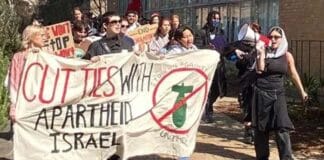When it comes to support for Palestine, there is a yawning gap between the mass of the Arab population and their leaders.
Israel is armed to the teeth by the US, serving as an imperialist watchdog state in the region. The US even restocked Israeli arms in the middle of its assault on Gaza.
Across the Arab world the Palestinians are widely understood as victims of Western imperialism, pushed off their land and condemned to brutal repression. Rakeen, a Saudi Arabian opinion pollster, surveyed 2000 Saudis, finding that 95 per cent supported the Palestinian resistance. Eighty-two per cent supported the firing of rockets into Israel.
The Saudi regime, on the other hand, was reluctant to blame Israel publicly and is widely suspected of colluding with it privately. It took until 1 August before Saudi Arabia’s King Abdullah condemned the war in Gaza, but he did so without putting responsibility squarely on Israel.
The situation is similar in Egypt where, as academic Khaled Elgindy put it, “support for Palestine and antagonism toward Israel are deeply ingrained in Egyptian political culture and national consciousness”.
Egyptian activists tapped into that mood when they organised an aid convoy to Gaza last month. They brought together more than 500 activists, 11 buses and $340,000 of medical aid. The Egyptian military turned the convoy back before the Gaza border—meanwhile clamping down on solidarity protests in the cities.
Military rule has put Egypt firmly back in the camp of the US, Saudi Arabia and Israel. The Saudi regime and its gulf allies, have spent $20 billion propping up Egypt since the military coup.
The regime headed by former army chief Abdel Fatah al-Sisi has given Israel considerable political support during its assault on Gaza.
But it also laid the groundwork for the invasion, closing the border crossing at Rafah while in the past year destroying more than 1600 tunnels under the Egyptian border that were used to smuggle crucial goods into Gaza. Meanwhile Hamas has been declared a terrorist movement and banned from operating in Egypt.
The immediate context for these betrayals is the Egyptian regime’s hatred of the Muslim Brotherhood. Hamas is an offshoot of the Brotherhood and al-Sisi is aiming to consolidate the Egyptian counter-revolution by eradicating any remnant of its influence.
But the pattern of betrayal is not new. The post-Second World War period saw a wave of Arab states winning independence from colonialism, sometimes under the influence of radical nationalists such as Nasser in Egypt and the Ba’ath parties in Syria and Iraq. Their language was often fiercely anti-imperialist, but they shared a common project—to construct independent centres of capital accumulation, ie successful capitalist nation states.
Their Palestinian counterparts yearned for the same thing, but were forced to mount a military struggle simply to try to regain their land.
The Arab regimes walked a contradictory political line. Popular sentiment meant they had to be seen to support the Palestine Liberation Organisation (PLO). But they were concerned to ring-fence the radicalism of the Palestinian guerrilla struggle from influencing politics in their own countries.
The PLO looked to what they saw as the progressive Arab regimes for support. The price was to refuse to engage in domestic politics within those countries.
In 1970, pressure from military attacks and more left-wing groups forced the PLO to act against Jordan’s Hashemite monarchy.
The Jordanian regime slaughtered thousands of Palestinians in an assault known as “Black September”.
Then it was the turn of Syria, which in 1975 sent troops into Lebanon to crush the popular resistance, made up of the PLO, and the Lebanese left and workers’ movement. Syria’s attack enabled the Phalangist fascist militia to massacre the Tel al-Za’atar refugee camp. In 1978, Egypt signed the Camp David Accords with Israel, a peace deal that freed Israel to focus on suppressing the Palestinians.
Even now, Hamas is reliant on supportive regimes—currently Turkey and Qatar. But their support for the Palestinians is balanced with accommodation with imperialism.
The Turkish regime, which is imposing neo-liberal policies on its population, is a loyal member of NATO. Qatar is a monarchy without a skerrick of democracy—and which hosts a strategic US air base.
Palestinian liberation will not come through alliances with such reactionaries. Their best hope lies in a revival of the Arab revolutions. The advance of the counter-revolution makes this more difficult. But in countries like Egypt the continuation of the same neo-liberal policies that bred anger and resentment at the regime of the dictator Mubarak means future explosions are inevitable.
Victory can only be a product of solidarity between the Palestinian masses and the workers and peasants who suffer beneath the heel of Arab dictators.
By David Glanz





